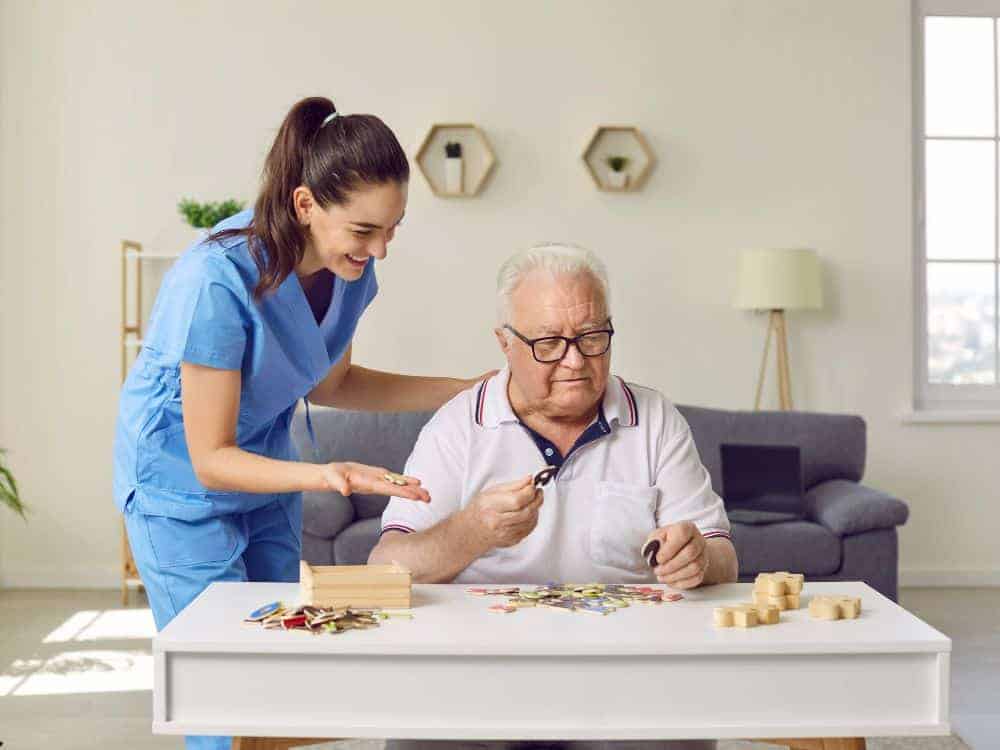
Are you a first-time family caregiver? Does learning about home care, memory care, and skilled nursing make you feel overwhelmed? What even differentiates these three?
There are various types of senior care to cater to individual needs. Most adult children in charge of making care decisions for their older parents usually get confused about whether to choose in-home assistance or a different option. “Which is better?” is a common question they have.
The maze of senior care choices can feel like an impossible puzzle to solve for those without a medical background. Many feel desperate for clear guidance. After all, if you stumble through the caregiving journey unprepared, making critical decisions with limited information can put you in a lot of emotional stress.
You’ve come to the right place if you’re a family caregiver who wants to get involved with your loved one’s health. This guide is your blueprint for learning everything you need to know about the various types of senior care, from independent living to assisted and in-home options.
Consider this your first caregiving crash course. By the end of this article, you’ll have the knowledge necessary to assist your loved one in making care decisions to improve their lifestyle and quality of life.
The Range of Senior Care Options
The comprehensive range of senior care options is like a well-stocked toolbox for a carpenter. Each hand tool is designed to address a specific problem or need. For example, a screwdriver fixes loose screws.
Just as a carpenter chooses the right tools to solve a specific problem, adult children or seniors select the best care that suits their situations for a perfect solution. That said, the range of senior care choices is as unique as a craftsman’s toolbox.
The Care Continuum
The continuum of care simply refers to the variety of services available to families. It’s a roadmap that outlines the stages of support for your senior parents.
The general consensus is that the older your loved one gets, the higher the level of care they need. It’s especially true for those with progressive conditions like dementia or Alzheimer’s. They may require minor assistance during the early stages of memory loss. However, they’ll need extensive care later on in life.
Therefore, their needs evolve through different levels of care as their condition worsens. The higher they are in the care pyramid, the more extensive their demands become. It’s how the care continuum works.
This increasing path of care is not rigid. It’s a flexible framework made up of many types of senior care designed to meet the ever-changing needs of seniors as they advance through the aging phase.
The care continuum represents a comprehensive approach to supporting seniors. It recognizes that aging is a unique journey for each individual. It’s a holistic system that provides:
- Seamless transitions between different levels of care
- Personalized support matching your loved one’s needs
- Comprehensive assessment of changing care requirements
- Emotional and medical support
Types of Care Settings and Services

There are many different types of senior care available today. The most pressing question when navigating is, “Which one is right for my mom or dad?” Here’s a quick overview of each type of care setting and services you can expect to access when choosing it.
1. Independent Living
Independent living allows your loved one to live in a community without the burden of owning a home or running a household. It’s similar to renting an apartment or private space, except that it’s within a compound exclusive to senior residents.
Who is independent living for? It’s for older people who are active and require minimal care support. Many move to this type of senior living because they find running a household too stressful. For instance, in the community, your senior parents won’t have to worry about mowing the yard or other light housekeeping tasks.
The community manager or administrator hires people to do these menial tasks so your loved one can have more free time for meaningful things, like socialization. The best advantage of independent living is it promotes an active, social life.
2. Assisted Living
As the name suggests, this type of senior living option is for older people who require a moderate level of care assistance. It’s a step up from independent living.
The profile of assisted living residents varies. However, some may have a chronic illness that needs extensive monitoring, like diabetes, heart condition, or mild cognitive impairment. These health conditions are progressive and get worse over time.
In most cases, assisted living residents are capable of staying independent. They just need a 24-hour caregiver to closely monitor any fluctuations in their health to prevent their condition from getting out of hand.
Services can be tailored to meet your loved one specific needs.
3. Memory Care

This type of senior care living option is for people living with cognitive impairment, such as dementia, Alzheimer’s, and other progressive neurological conditions.
Over 55 million people live with dementia. Each year, almost 10 million new cases are diagnosed, according to the World Health Organization. Memory care communities support individuals with cognitive loss to maintain their quality of life as the disease advances.
The most important of all is the security of the environment. People with moderate to severe dementia are prone to wandering, making the home unsafe. Memory care homes will give you peace of mind. Caregivers are present within the community around the clock. If your loved one wanders, someone is there to assist them right away.
4. Skilled Nursing Facilities
Skilled nursing offers the highest level of medical and rehabilitative care outside of a hospital. This type of senior care is provided by a registered nurse, licensed therapist, or physician for a few days or weeks following a hospital discharge.
Skilled nursing facilities (SNFs) offer round-the-clock medical support. It’s ideal if your loved one needs outpatient care after a critical illness, injury, or surgery.
Skilled nursing is tailored to the patient’s needs. You or your loved one receives adequate care that suits your health situation.
5. In-home Care
Some seniors who want to receive care in the comfort of their home may opt for in-home care. This type of care is perfect for capable older people who need support with managing their medications, or activities of daily living like bathing, eating, or grooming.
You can hire an hourly caregiver to keep your mom or dad in their homes. The caregiver can assist with light housekeeping, provide companionship care and accompany your older relatives on social activities. Care services are flexible and tailored to one’s needs.
Factors to Consider When Choosing the Type of Senior Care

Which care service is the best for your senior mom or dad? Here are some things to think through when deciding which type of senior care guarantees to improve your loved one’s health and quality of life.
1. Medical Needs Assessment
How much care does your loved one need to stay independent? Here are a few considerations when assessing their level of care demands and whether assisted or in-home care will meet their needs.
- Current health status and medical history
- Chronic condition management
- Mobility limitations
- Medication complexity
- Potential future health trajectories
Some health conditions are progressive and worsen over time. However, chronic ones like diabetes can be managed effectively to prevent it from developing into a serious case.
2. Personal Preferences and Lifestyle
Is your loved one physically active? Do they eat healthy? Nutrition, physical activities and other lifestyle factors are crucial in health. Preserving wellness through old age depends on these aspects:
- Individual personality and motivation
- Social interaction needs
- Desired level of independence
- Cultural background
- Personal hobbies and interests
Knee, joint, or body pain discourages most seniors from living more actively. A workaround is to engage in movement activities that are gentle on the body yet fun, like aquatic exercise.
3. Financial Capacity
Having stashed away enough cash can give you more options for care. Some things to take into account when choosing the type of care for a loved one are:
- Available financial resources, whether in liquid cash or hard assets
- Insurance coverage
- Long-term affordability
- Eligibility for government assistance and services
- Cost comparison between care options
Locations matter in the hourly caregiving rate. If your loved one needs long-term help, you have a better shot at sustaining it if you move into cities where hourly in-home care is affordable.
4. Family Dynamics and Support System
Some children contribute cash and pay for their loved one’s care. Meanwhile, others become unpaid caregivers. The family is an important part of the care dynamic. They help determine your choices for senior care. Other key considerations include:
- Proximity of family members
- Emotional support availability
- Caregiver capacity
- Communication preferences
- Decision-making processes
The more involved each family member is to their loved one’s care, the easier it is to transition between levels of care.
5. Quality of Care and Environment
Huge and well-managed facilities often have the best conditions for recovery. When deciding whether to choose between independent, assisted or memory care, some factors to consider are:
- Staff-to-resident ratio
- Facility cleanliness and maintenance
- Staff qualifications and training
- Safety protocols
- Recreational and social opportunities
A smaller organization like Amy’s Eden Senior Care which only accepts two residents per home is a better alternative than a larger facility that feels like an institution. A higher staff-to-resident ratio favors your loved one. In this case, one caregiver for two residents ensures they receive adequate and the highest care quality.
A Deep Dive Into the Types of Senior Care

Here’s an in-depth overview of the various senior care options available to you.
1. In-Home Care
Among the many types of senior care, in-home care services are one of the most popular choices.
Picture this: Your dear mom sits in her favorite rocking chair, sipping her tea while enjoying the garden view. The bookshelf in the corner displays family photographs, each telling a story of love and connection. She’s in her sanctuary, her place of comfort and independence.
In-home care allows her to stay in this cozy space she holds dear in her heart while receiving the support she needs to continue living life fully.
In-home care is a deeply personal approach to senior support. It’s a compassionate solution that brings professional caregiving directly into any place your loved one considers home.
A published study supports this concept, highlighting the importance of continued comprehensive care that adapts to individual needs. Unlike institutional settings, in-home care maintains the warmth, familiarity, and emotional security of home.
Benefits Of In-Home Care for Seniors
Receiving care at home goes beyond convenience. It helps maintain dignity, preserve independence, and honor the golden years of your loved ones. Seniors who remain in a familiar environment often experience significant emotional and psychological benefits, which complement their physical health.
Emotional stability is important for healing, and home is the best place to nurture positive feelings. It represents more than just a physical space. It’s a source of memories, personal identity, and a sense of self.
When seniors are surrounded by their personal belongings and cherished memories, they maintain a stronger sense of control and purpose. This emotional continuity can dramatically improve mental health, reduce anxiety, and support overall well-being.
Families find comfort in knowing their loved ones receive personalized care in a setting that feels safe and familiar. Professional caregivers become partners in care. They work alongside families to ensure comprehensive, compassionate support.
Types Of In-Home Care Services
Every senior has distinct needs, preferences, and lifestyle. Anyone benefits in in-home care because it’s flexible. It can be tailored to provide just the right amount of support, whether a little help around the house or full-time care.
Some services offered in in-home care includes:
Sometimes, what your loved one needs is emotional and not physical support. Companion care focuses on providing meaningful social interactions. Caregivers become reliable conversation and game partners for your loved ones. Their presence helps prevent isolation that can accompany aging.
For many seniors, this human connection becomes a lifeline. Caregivers keep their minds active through small talk and provide a sense of continued relevance in the world.
Personal care includes but is not limited to assistance with bathing, dressing, grooming, and mobility. The goal is to not take away independence but to support it. Your loved one does the tasks they can while their caregivers provide gentle, professional assistance where needed.
- Practical Home Support
In-home services also include household management help. Some seniors may find cleaning their homes a burden. Caregivers can do these things, including meal preparation, laundry, and running errands. They empower seniors by involving in house chores and decision-making. Doing so helps maintain their sense of purpose and contribution.
- Medical and Health Monitoring
For seniors with more complex health needs, in-home care can provide necessary support. This help includes medication management, health monitoring, and outpatient care. Some skilled care services may also be available by hiring registered nurses or other professionals.
Choosing in-home care is the best decision if your loved one wishes to stay in their home. A homelike, familiar environment can help restore their optimal health.
2. Assisted Living
Assisted living units offer a supportive living environment for seniors who require assistance with daily activities but still desire a high level of independence. Residents have access to a range of services and amenities, such as dining options, housekeeping, and social activities.
An ideal assisted living home allows residents to have autonomy over their life and routines. They enjoy the following benefits:
- Independence: They retain a significant degree of control over their daily schedules, maintaining a sense of normalcy and self-determination.
- Support: Trained staff provides assistance with essential tasks like bathing, dressing, and pill management.
- Socialization: Engaging programs and communal activities foster social interaction, reducing feelings of isolation and loneliness.
Amy’s Eden Senior Care offers a unique approach to assisted living, prioritizing personalized care in a home-like setting.
Our assisted homes are designed to accommodate a maximum of two residents, which guarantees each individual receives the attention and support they need. This small-home model allows us to provide a more intimate and personalized experience to foster a strong sense of community and belonging.
Services and Amenities
Assisted living communities offer a myriad of services and amenities tailored to the needs of older residents. These may include:
- Personal care: Residents with physical challenges can get hygiene help. Keeping themselves clean all the time is essential in preventing diseases or infections.
- Medication management: Medications not taken on time can make them less effective. Caregivers remind your loved one of the right dose and time to take their pills. Compliance with prescriptions boosts treatment plan outcomes.
- Meal preparation: Food is natural medicine. Assisted homes typically have a chef who prepares delicious and healthy meals. Residents mingle with their neighbors in the shared dining area. Mealtimes turn into a meaningful time for socializing and sharing stories.
- Housekeeping and laundry: Residents can enjoy a tidy and comfortable living space without the hassle of doing household chores.
- Transportation. The staff can schedule transportation to take residents to their doctor’s appointments, shopping, and social outings.
- Social activities: Activities that promote socialization abound. For example, residents can choose between games, arts and crafts, and fitness classes to fill their daily timetable. These group sessions also promote cognitive stimulation.
- Health monitoring: Assisted homes coordinate with local doctors to visit the community for on-site check-ups. Your loved one won’t have to travel to check their vitals or update their treatment plan.
- Emergency response systems: These facilities are equipped with 24/7 emergency call systems that provide peace of mind for families. Caregivers can respond promptly in health emergencies.
Choosing the Right Assisted Living Facility
Assisted living is a notch higher than independent living. Consider the following factors if you plan to relocate your loved one:
- Level of care: Ensure the facility can provide the appropriate level of care for your loved one. Care needs decrease or increase over time. Ask the facility manager if they can accommodate higher levels of care demands.
- Amenities and services: Some assisted homes are a destination on their own, complete with modern amenities and services to improve living quality. Schedule a tour to see what amenities and services are available to you. Shared outdoor spaces, an indoor pool, and a fitness center make a difference in an enjoyable and active lifestyle.
- Staffing and training: Well-trained and experienced caregivers provide quality care. Look for a home with a high caregiver-to-patient ratio so your loved one doesn’t have to wait to get care.
- Safety and security: Prioritize facilities with safety measures in place, such as emergency call systems and 24/7 staff. Secure entry points are a must if your loved one experiences memory loss.
- Social atmosphere: An environment that makes it easy to socialize contributes to a resident’s overall well-being. Check the facility’s calendar of social activities. Opportunities for interaction are essential for robust mental health. Remember to ask if residents can suggest activities they love, such as gardening or technology classes.
- Location: The location of the facility should be convenient for family and friends to visit. Consider factors such as proximity to medical facilities, shopping centers, and public transportation.
- Cost: Evaluate the cost of care, including monthly fees and additional charges for services. Be sure to understand the facility’s payment policies and any potential financial assistance programs.
- Licensing and accreditation: Check for the home’s license and accreditation. These documents indicate compliance with state and federal regulations and a commitment to quality care.
Sometimes, it takes months to pick the right assisted living community. It’s a journey in itself that families have to go through. If you need to transition urgently for the sake of your loved one, working with a senior care advisor is your best bet in making informed decisions.
These professionals know the industry like the back of their hand. They can suggest the best assisted living units near your area and answer questions about financing options. With their help, you can cut down the time and effort spent in looking for a facility. Consequently, your loved one can get it immediately.
3. Memory Care

Memory care addresses the unique needs of seniors with dementia. Dementia is a progressive condition that affects the brain and its functions. It has three stages — early, middle and late dementia.
This brain disorder impacts both seniors and their families. As memory loss advances, memory, thinking, and problem-solving skills considerably decline. Ultimately, your loved one becomes fully dependent on their caregivers to do their tasks.
Memory care facilities are specifically designed to address the unique needs of people living with dementia, Alzheimer’s disease and conditions that affect memory, like Parkinson’s disease.
Benefits of Memory Care
Memory care facilities offer numerous benefits for seniors experiencing a cognitive decline. These include:
- Specialized care: Memory care units employ trained staff who understand the complexities of dementia. They provide specialized care, including assistance with daily living activities and managing medications and challenging behavioral symptoms.
- Safe and secure compound: The environment is designed to support seniors who wander or get disoriented with time and location. Facilities have controlled entry and exit access and safety prevention measures. These features ensure residents can move freely within the facility while still minimizing the risk of accidents or injuries.
- Social interaction and stimulation: Engaging activities and social programs, such as games, puzzles, music therapy, and art classes, stimulate cognitive function. Engaging in these things can preserve mental abilities and reduce feelings of isolation. They also promote a sense of purpose and well-being.
- Peace of mind for families: The home can become unsafe for a loved one with severe dementia. Moving to a memory care unit allows families to sleep at night worry-free. Knowing their loved one is supported every minute gives them peace of mind.
Types of Memory Care Services
Memory care facilities offer a heap of services to meet the individual and high-level care needs of their residents. These include:
- 24/7 care monitoring and supervision: Caregivers are on-site around the clock to oversee residents’ well-being and safety.
- Medication management: Since residents often forget to take their pills, caregivers directly manage their medications. While dementia can’t be cured, some drugs, like donanemab (kisunla), can help delay the symptoms or decrease pain. That’s why critical prescriptions are taken on time. Doing so increases adherence to the treatment program.
- Personalized care plans: Dementia caregivers receive specialized care education. Many also undergo ongoing training to better understand the disease. Therefore, provided care is tailored to address each resident’s needs.
- Mind-boosting activities: Puzzles, games, and art therapy are more than just activities for fun. They serve as an exercise for the brain. Caregivers join residents in these social programs to stimulate their mental ability and potentially delay cognitive impairment.
- Physical and occupational therapy: Residents with mobility challenges can participate in fitness programs to maintain their physical health and live actively. Movement activities can improve mood, relieve stress, and boost memory. Exercise is good for both the body and the mind.
- Dietary and nutritional support: Kitchen staff prepares meals and snacks that are good for the brain. A daily, healthy plate consists of fresh fruits and vegetables sourced from local farmers. Wholesome dishes and fares are critical to prevent nutritional deficiency.
- Behavioral management techniques: Severe cognitive impairment causes complex behavioral changes, like sundowning or aggression. Part of extensive dementia caregiving training is managing these symptoms for residents’ safety.
The type of individualized care memory care facilities provide can significantly improve the quality of life of loved ones with dementia.
For example, a study examined the impact of memory care on residents with dementia. Researchers found people who receive memory care had a lower risk of nursing home admission compared to those receiving standard assisted living services.
Therefore, it’s important to choose the right memory care community. Never rush a decision about relocating. To make the transition less stressful for both you and your loved one, create a checklist that includes common questions you have for the staff.
For instance, how many residents are allowed per home or the schedule of the caregivers. The answers you’ll get will help you whittle down your options to the best ones. Consequently, it will curb relocations later on, which can be stressful for your mom or dad with dementia.
4. Skilled Nursing and Long-Term Care
SNFs offer patient-centered medical and rehabilitative services for individuals who require short- or long-term care. SNF residents often have a condition, injury, or surgery that has diminished their ability to stay independent. Once they feel better, they may choose to move to an assisted home or continue to recuperate at home.
Benefits of Skilled Nursing Facilities
SNFs are staffed with licensed professionals, including nurses, therapists, and social workers. These communities provide a higher level of medical care and support than assisted living homes.
Long-term care and skilled nursing facilities highlight the importance of SNFs in providing:
- Post-hospital care: Staff provides rehabilitative services following surgery, illness, or injury for residents to regain their skills and strength before returning home.
- Long-term care: Nurses support residents with chronic health conditions or disabilities who require ongoing medical supervision and support with daily activities.
SNFs offer all-inclusive services that include:
- Medical care: Care staff work in shifts to provide 24/7 nursing care and personal support.
- Rehabilitation therapy: Families onboard physical, occupational, and speech therapists to help residents reclaim their mobility, strength, or cognitive function.
- Dietary services: Like assisted and memory care, SNFs offer customized meal plans tailored to individual dietary needs.
- Social and recreational activities: SNFs also encourage residents to stay mentally, socially, and physically active through various structured programs.
When might someone need skilled nursing care?
- After a hospital stay: Your doctor may recommend skilled nursing if your loved one needs ongoing medical care and rehabilitation before returning home. For example, they may have fallen or slipped in the bathroom, which led to a broken hip. Falls can be fatal, and roughly 684,000 die from them.
- For chronic conditions: Progressive conditions like diabetes, heart disease or brain injury may necessitate skilled nursing care.
- For end-of-life care: It may also be necessary if your aging relative is facing a terminal illness, like cancer.
Differences Between Skilled Nursing Care and Other Types of Care
Here’s a breakdown of how skilled nursing care differs from assisted and in-home care options.
| Feature | Skilled Nursing Care | Assisted Living | In-Home Care |
|---|---|---|---|
| Level of Care | High | Moderate | Low to moderate (varies) |
| Medical Oversight | 24/7 by licensed medical professionals | Limited medical oversight, regular assessments | No medical oversight relies on external providers |
| Rehabilitation Services | Intensive therapy programs offered | May offer limited therapy services | No therapy services included |
| Independence | Varies depending on individual needs | Residents retain significant independence | Highest level of independence |
| Cost | Highest cost | Moderate cost | Varies depending on services |
Paying for Skilled Nursing Care With Long-Term Insurance
Long-term skilled nursing care is expensive. Fortunately, insurance options can help offset the costs associated with it and other continued care services.
Long-term care (LTC) insurance is a type of coverage that pays for care services, such as those provided by skilled nursing homes. Many sign up for this plan as a financial cushion and to afford care during old age.
Encourage your loved one to get insured while they’re still healthy since it’s more economical. Premiums are much more affordable if risks are low.
Insurance prices vary depending on age, health, and level of coverage. In the 2022 data by the American Association for Long-term Care Insurance, the average premium for a policy with $165,000 in level benefits was $950 each year or about $79 per month for a 55-year-old single man.
For the same-age single woman, the average cost racked up to $1,500 per year or about $125 per month. As you can see, gender affects premium costs. Other factors that may drive premiums up include the following:
- Benefits: Typically, LTC insurance policies are flexible. You can withdraw the funds to pay for skilled nursing care, assisted living, and home health care services. Expensive plans have a higher benefits package.
- Eligibility: Pre-existing conditions may impact your ability to purchase or upgrade coverage. Be honest about your health situation during the application process to avoid insurance denials later on.
- Waiting periods: Many policies have waiting periods before benefits kick in, ranging from 30 to 90 days. Be aware of this to avoid any financial gaps in your care.
- Benefit limits: Policies have maximum daily and lifetime benefit limits. Choose a plan with restrictions that coincide with your projected needs for long-term care.
One tip is to consult a qualified insurance agent to understand what you’re getting in exchange for what you’re paying.
5. Independent Living Communities

This type of senior living option is perfect for those who want to downsize, skip the responsibilities of running a household, and live more actively.
Independent living homes provide a supportive environment for aging gracefully. Residents enjoy their own private spaces while having access to a wealth of amenities and social opportunities.
Independent Living as a Senior Care Option
Did you know? According to a study, seniors who move into a community, such as independent living, tend to live longer and experience a higher quality of life compared to those who remain living alone at home.
Independent living is perfect for older people who:
- Value their independence: Residents maintain control over their daily routines, choosing when and how they want to live.
- Seek social connection: Communities foster a sense of belonging through social events, clubs, and activities.
- Desire a maintenance-free lifestyle: They’re relieved of chores like housekeeping and yard work, allowing them to focus on leisure and meaningful activities.
- Peace of mind: Many communities install emergency call systems and have on-site staff available whenever residents need assistance.
Services and Amenities Offered
Independent living communities provide an array of services and amenities designed to enhance residents’ well-being. These may include:
- Private apartments or cottages: Residents have their own living spaces, allowing for privacy and personalization.
- Meal options: Dining services offer convenient and nutritious meal choices, often accommodating dietary restrictions.
- Housekeeping and laundry services: Without the burden of household chores, residents are more free to pursue purposeful hobbies.
- Transportation services: The concierge can arrange transportation services to take your loved one to their appointments.
- Fitness and wellness programs: Your senior mom or dad can join exercise classes or sports to keep them engaged and active.
- Social and recreational activities: Communities schedule a variety of group activities, from card games and movie nights to art classes and educational workshops.
- On-site amenities: Many communities have a pool, library, beauty salon, and courtyard, which makes residents feel like they’re always on vacation.
Choosing the Right Independent Living Community
Independent living often suits new retirees. If your loved one wants to move into a smaller space after quitting their job, consider these factors when selecting an independent living unit.
- Location: Most seniors have problems adjusting to a new environment. Therefore, consider a nearby community so it’s easier to see their grandkids or invite friends over for coffee.
- Apartment or cottage size and layout: Most communities offer shared, studio, and one- or two-bedroom floor plans. Choose one that meets your loved one’s needs. If they want an affordable room with more privacy, a studio may be the best pick.
- Amenities and services: A studio room may only have a kitchenette. If your loved one enjoys baking or cooking a lot, a private space with a fully equipped kitchen may suit them.
- Security features: Choose a community that prioritizes their residents’ safety, regardless if they can live on their own or require minor caregiver support. Make sure walking paths are well-lit grounds, and emergency systems are functioning.
- Social atmosphere: Some communities have a full social calendar to keep their residents engaged. Check if any of these activities interest your loved one.
- Cost: Besides the basic monthly fee or rent, check for any add-on services. For instance, you may need to pay extra for laundry.
Your loved one thrives in a supportive and enriching environment. Make sure you involve them in deciding for their next independent living home.
Choose Your Next Home In Peaceful Nevada

Start your journey to meaningful golden years in one of Amy’s Eden Senior Care homes. We will take care of you at our beautiful and inviting assisted abodes around Reno and Carson City. We provide a wide range of caregiving services, from in-home care to memory care.
Our friendly caregivers are available around the clock to help your loved one, from managing their medications to toilet assistance in the middle of the night.
Here, we help your loved one thrive to boost their happiness and life satisfaction. Ready to take the next step? Schedule a free consultation with one of our senior care experts or take a virtual tour of our cozy homes. We can’t wait to see you here.




